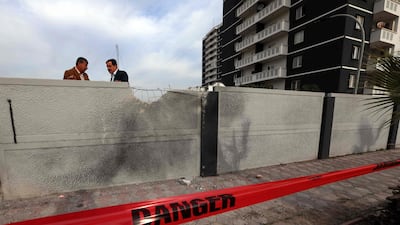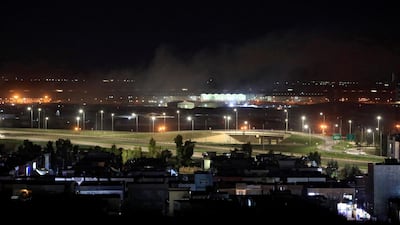The US on Thursday carried out air strikes in Syria against facilities belonging to Iran-backed Iraqi militias.
President Joe Biden's first military action in the Middle East came in response to recent attacks against American and coalition personnel in Iraq.
The strike occurred near Bukamal, on the Syria-Iraq border, and targeted infrastructure belonging to Iranian-backed Iraqi militia groups Kataib Hezbollah and Kataib Sayyid Al Shuhada.
"We have acted in a deliberate manner that aims to de-escalate the overall situation in both eastern Syria and Iraq," said Pentagon press secretary John Kirby.
The extent of the damage and casualties has yet to be confirmed. A Kataib Hezbollah source told The National that one member of the militia was killed in the strikes and several others injured.
The Syrian Observatory for Human Rights, a Britain-based war monitor that follows the conflict in Syria through sources in the country, reported that 17 militia members were killed.
“I’m confident in the target that we went after, we know what we hit,” US Defence Secretary Lloyd Austin said, speaking shortly after the air strikes.
“We’re confident that that target was being used by the same Shia militants that conducted the strikes,” he said, referring to a February 15 rocket attack in Erbil.
Mr Austin said he recommended the action to Mr Biden.
"We're very deliberate about our approach, as you would expect us to be," the former general said. "We allowed and encouraged the Iraqis to investigate and develop intelligence, and that was very helpful to us in refining the target."
The US military response came after Iran-made rockets were used in an attack last week against a military complex in Erbil, where US-led coalition troops are based. The strike in the semi-autonomous Kurdistan Region of Iraq killed one civilian contractor and wounded a US serviceman and nine others.
The US said their response was proportionate and "conducted together with diplomatic measures", including consultation with US partners in the anti-ISIS coalition.
The move from Mr Biden appeared limited in scope, while still sending a message to Iran that the US will not tolerate military aggression.
The US conducted seven air strikes targeting a border crossing used by the Iran-backed militia groups to move weapons and goods across the Iraqi-Syria border, Politico reported.
The decision from Mr Biden to use military force against Iran-supported groups came as the two countries face a stalemate over returning to the 2015 Iranian nuclear deal, known as the Joint Comprehensive Plan of Action. The deal was abandoned by former president Donald Trump in 2018.
Mr Biden may have chosen a measured military response, targeting infrastructure and possibly hoping to minimise casualties, in order to keep negotiations going between Iran and the US.
The strategic decision to carry out the strike in Syria, and not in Iraq, will provide the Iraqi government with breathing room as it carries out its own investigation into the February 15 attack that wounded Americans.
Mr Biden may have also avoided an attack in Iraq to discourage Iran-backed militias operating in Iraq from furthering their campaign for US troop withdrawals.
Iran-linked groups in Iraq have long pushed for the US to leave the country, with the intention of filling the security vacuum that would result from a US exit.
"If the troop withdrawal occurs it will leave Iraq in the hands of Hashed Al Shaabi and Iranian proxy forces," a Kurdish government official told The National.
After the January 2020 airstrike that killed Iranian general Qassem Suleimani and senior Iraqi militia leader Abu Mahdi Al Muhandis, politicians in Iraq voted in parliament for foreign forces to leave the country.
Retaliatory US military strikes occurred several times in the past few years when US military interests in Iraq were regularly targeted.










